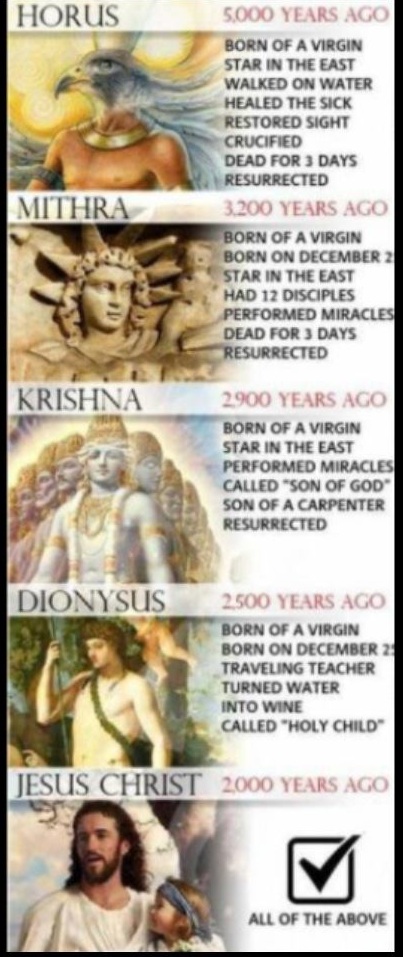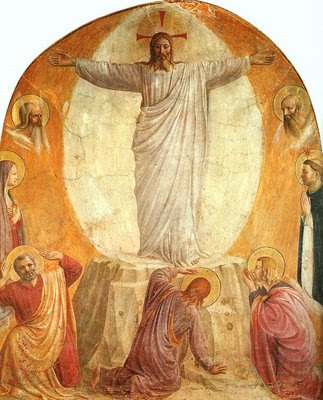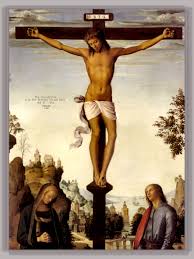

**
The Bible's Gospels contain the story of Jesus as retold supposedly by Luke, Mark, Matthew and John, the "divinely-inspired" witnesses. Problematically, these accounts contradict each other in many pivotal areas, such as in geography, the Resurrection, The Crucifixion, Jesus' birth, historical dates etc. This undoubtedly is in major part because the canonical Gospels were not, contrary to popular belief, actually written by Luke, Mark, Matthew, and John directly; rather, they were recorded down as their "words" decades upon decades (at best) following the alleged Resurrection, and were not finalized until 170-180 AD officially, as even the Catholic Encyclopedia admits (hence the Gospels being oh-so-subtly prefaced, 'According to'). Hence, the likelihood of significant inaccuracy, perhaps to the point of slander even, is remarkable. That thought on hand, curiously, the widespread "What would Jesus Do?" movement (marketed, for example, in bracelets) encourages one to act like Jesus, the said perfect role model. Obviously however, it's reasonable to have doubts about the actions of Jesus (or even his existence), given that large portions of the Gospel text remain either unsubstantiated historically, self-exculpatory in their storyline contradiction, or both. Therefore, an illuminating review of the Gospels and their conflicting accounts of Jesus, their moralized "Savior", is necessary.

First of all, the existence of Jesus is not absolutely undisputed, given there is no DIRECT evidence of the Bible-chronicled Messiah named Jesus Christ. Secondly, if we are to speak realistically, there is obviously no way documents created decades or even centuries later could be believed accurate, yet Christians nevertheless maintain their same defense that the Bible is inerrantly "God's own words." Therefore, if we are to accept their belief no less that the Gospels are truly the unaltered divine word, then they must meet the tough expectation of perfection, right? Of course. That said, what from the start totally baffles me is the birth of Jesus, which alone is proof enough of the (frankly) embarrassing, unarguable inconsistency between the Gospels. To specify on this matter of fact, it indeed would seem most alarming how his birth is portrayed significantly different in each of the Gospels' texts: "Matthew" dates the birth two years prior to King Herod's death ["Matthew" 1], whereas "Luke" places it nine years after Herod died, "when the census took place" ["Luke" 2], though both name Bethlehem his birthplace; "Mark" doesn't mention Jesus' childhood at all, while in "John" Jesus is from Galilee and renounced by the Jews for NOT being born in Bethlehem [ "John" 7:41-42]. In addition, Jesus' early life is SUBSTANTIALLY different in "Matthew", in which Mary, Joseph and baby Jesus hide in Egypt from King Herod, who, desperate to slay Jesus at any cost, ordered the death of all newborns in fear that Jesus really was the prophesied messiah, and thereby a huge threat to his throne ["Matthew" 2:15; 2:19; 2: 21-23]. Such a critical part of Jesus' history should surely be consistent, yet even "Luke", which at least shares Jesus' birthplace with "Matthew", offers separately that Jesus grew up in Jerusalem ["Luke" 2:22; 2:39]. These major introductory ambiguities between the four Gospel "writers" are alone plenty to negate the claim that the Bible is "the unaltered word of God."
Continuously, nonetheless, several more key extraordinary events are inconsistent throughout the Gospels as well. For instance, while there is clear mention of Lazarus in "Luke", only "John" features Jesus raising him from the dead [ "John" 11: 33-44]. If the good news of Jesus really spread to local and foreign lands alike, it seems quite strange that him resurrecting a dead man would be referenced in just one Gospel. And why does only "Matthew" have Jesus making Peter the destined church builder and keeper of Heaven's keys ["Matthew" 16:17-19]?! Doesn't the appointment of the church's earthly leader seem just a bit more vital? Another unacceptable discrepancy is the timing of when Jesus was crucified: "Mark" states, "And it was the third hour and they crucified him ["Mark" 15:25]." "John" recounts, "And it was the preparation of the Passover, and about the sixth hour; and he saith unto the Jews, Behold your king…Shall I crucify your king? ["John" 19:14-15]." This egregious error about Jesus' dying hour, like the one about his birth, dispels the credibility of the Gospels majorly. If the most important events of Jesus' life cannot be corroborated between the four canonical Gospels, what are the chances that his "moral" messages are preserved verbatim?

It's fair also to say the Bible should be pretty straightforward on communicating to the "Lord", He whom allegedly saves only his disciples from eternity in Hell, correct? Well, subsequently in the New Testament, "Timothy" and "Acts" critically disagree with "Matthew" on whether it is appropriate to pray publicly: confusingly, while "Timothy" says public prayer should be highly encouraged [1 "Timothy" 2:8], in "Matthew" it's forbidden by Jesus [ "Matthew" 6: 5-6]. In "Acts" Paul, who wrote most of the New Testament's volumes, orders, "Remember the words of the Lord Jesus, how he said, 'It is more blessed to give than to receive'" ["Acts" 20:35], but Jesus never said that in any of the Gospels. In "Matthew" 5-12, Jesus' first sermon took place on a mount, however it occurs on a hill in "Luke" 6:17-20. How can these statements be "divinely perfect" when one negates the other!? What is an ideal follower of Jesus really supposed to believe in, considering many, if not all, statements in one Gospel must be totally false? How can one's actions be validated under the law of Christ when the "scriptural divinity" contradicts itself?!
As a matter of fact, just the one monumental argument over Public Prayer alone beautifully illustrates an example of the many simply unanswerable questions that the inconsistent Gospel texts leave us pondering: for example, is it safe to publicly pray, and in addition, what behavior do I choose when affronted by contradictory Christs in the Bible? It must ultimately be up to each person to skew the "good news" which Christians vociferously spread to non-Christians for themselves. Hm. How is one to basically accept the Bible is perfect but also judge which characterization of "Christ" (depending on the Gospel) makes him or her self a true Good Samaritan? After all, we mustn't be lukewarm according to the New Testament ["Revelation" 3:16], so how can I just pretend away that - depending on the given Gospel - my conduct might or might not be righteous and Christlike?! Specifically, "Matthew" offers the greatest dilemma of moral choices, and nicely proves how unmeasurable the "canonical" inaccuracies can be: "Let your light so shine before men that they may see your good works", says "Matthew" 5:16; but "Matthew" 6:1-4 reads,"Take heed that ye do not your alms before men, to be seen of them…that thine alms may be in secret"; contradicting itself a third time, the Gospel later posits, "Do not ye after their [Pharisees'] works ... all their works they do for to be seen of men" ["Matthew" 23:3-5]. What a mess. Later on, however, the New Testament's "Peter" explains, "Having your conversation honest among the Gentiles: that ... they may by your good works, which they shall behold, glorify God in the day of visitation" [1 "Peter" 2:12]. The simple fact of the matter is that nothing Biblical can be potentially singled-out as assuredly valid - it's too inconsistent!

What's really unsettling is how each Gospel seems to pronounce a different, game-changing nature. They obviously are open to, understandably, total historical disregard (by the rationale of only common sense, mind you), for the Gospel texts are without proper substantiation. The separate issue of whether "divine" credit can be given to the Gospels, however, brings dubious questions: did God purposely make certain errors in His writing? If not, why should anyone believe that the rest of the Bible is God's truthful Word? Do the Gospels base at least on Jesus' literal character, or is he just amongst many other heroic characters romanticized throughout centuries? Essentially, shouldn't the biographical inaccuracies between the four canonical Gospels disprove the Bible's 'divinity'? Both sides debate this inconclusively, which poses the question of whether there's scriptural proof to explain all this. I think very strongly that if Jesus were an unheard of fictional character with no "salvation" to give everyone, the Gospels would lack acceptance in the mainstream. A prime reason for this is in a "Mark" passage that's sickeningly deplorable: it shows parents revolting against Moses' laws by not MURDERING their disobedient son by stoning. [This was one of many of the most abominable laws in the Old Testament which enforced murder.] Surely Jesus would have thought to commend their morality, but instead fiercely scorned them for breaking Old Testament law [ "Mark" 7:9]! If it were just featured in this passage, it would be hypocritical to not look skeptically at the atrocity. But very literally a similar scene appears in "Matthew", too! "Matthew" 15:4 illuminates identical apathy in Jesus: "He that curseth father or mother, let him die the death.” In a lesser but still appalling disparagement of children, Jesus bargains followers that if they abandon their needy children and wives [who, in such a sexist time, suffered co-dependency at best and nothing else], a big reward will await in heaven [ "Matthew" 19:29]. There is nothing more despicable in the world than the abuse of a child - wouldn't you of course agree that anyone condoning and even encouraging that is certainly no hero to be reckoned with?!
In addition, Jesus condones slavery and even supports terrible beatings. For hundreds of years of America’s early history, The Gospel of "Luke" was the prime GOSPEL force used to support slavery, reading, “The servant who knows the master’s will and does not get ready or does not do what the master wants will be beaten with many blows. But the one who does not know and does things deserving punishment will be beaten with few blows. From everyone who has been given much, much will be demanded; and from the one who has been entrusted with much, much more will be asked" [ "Luke" 12: 47-48]. I see that as an ironic slap in the face to the HEAVILY-Christian, African American community, which suffered slavery in this country for HUNDREDS of years before human enslavement was finally abolished in 1865. Such texts very illuminatingly prove how uninformed society really is on the Bible and Christianity. Speaking of that, today we socially have an obviously huge problem regarding religious intolerance which, yes, is HUGELY encouraged and condoned all-throughout the Scripture. For example [of many], "John" foreshadowed modern-day irrational, cruel intolerance when he defamed that a non-Christian is,“a deceiver and an anti-Christ [2 "John" 1:7]"; also mirroring 2,000 years of stagnation, "John" explains that associating or even greeting a Non-Christian is wrong, as he presumes them obviously subhuman [2 "John" 1:10]. In "Matthew", Jesus condemns entire cities to eternal torment in hell because they didn’t like his preaching [ "Matthew" 11:20]; that, for a nice change, actually matches well with a line in "Luke", in which Jesus declared another self-righteous abomination: "If any man come to me, and not hate his father, and mother, and wife, and children, and brethren, and sister, yet, and his own life also, he cannot be my disciple [ "Luke" 14:26]." That's some serious narcissism, eh?

Speaking of narcissism by the way, Jesus also, according solely to the Gospel texts, was constantly disrespectful and highly patronizing toward his mother. To speak preliminarily, of course most Americans have likely heard the tale of 12-year-old Jesus going missing and Mary and Joseph finding him at the synagogue, teaching, surprisingly; but rather than apologizing for sending his parents into panic, Jesus dismisses his own misbehavior by saying (and I paraphrase), 'My father told me to come here' ["Luke" 2: 41-52]. People completely fail to regard the petulant disobedience, not profoundness, in young Jesus' actions. Anyhow, all throughout the Gospels nonetheless Jesus consistently addresses his mother as "Woman", not "Mother", and usually only ever to order her around! For example, in "John", “Woman, why do you involve me?” Jesus replied. “My hour has not yet come!” ["John" 2:4]. (Many similar examples are plentiful within the Gospels.) Some Christian apologists have tried to argue that "woman" in the Gospels' context is the equivalent of 'Ma'am' in the vernacular, but that is linguistically inaccurate; distinctively, Jesus used the Hebrew term for “woman”, gunai, when addressing Mary, and NOT the Hebrew word for “mother", meetros. So with that said, yes, all in all the alleged "Son of God" and Christian messiah is particularly documented for his failure to honor his own mother on a number of occasions within the Gospels (which, much too remarkably, is a dire violation of Moses' laws; the fifth of the all-important Ten Commandments states 'Honor thy Mother and Father').
Although countless more incredible examples can be cited to discredit the Gospels' alleged credence, Christian America remains ignorant. But why, I beg to know? How can a Christian believer just overlook the countless contradictions between the only four canonical Gospels in the Bible, considering so many of them pertain to the most significant events in Jesus' life and ministry?! Tell me, why selectively acknowledge Jesus for saying lots of positive things and dying for our "sins", but not for his immoral actions that bring his authority into question? Once again, why, Christians worshipers, do you feel confident in your trust in this "character" for eternal life? Pure ignorance, apparently, is the single-handed catalyst keeping your belief ever-alive. Put simply, the constant glare of ambiguity in the Gospels' texts is much too deep-seated. It without question invalidates the Christians' assertion that their texts accurately depict, or even closely resemble for that matter, the supposed "historical" Jesus (if he indeed existed). It is more than suspect that none of them closely recount the truth as it may or may not have happened. In fact, it seems likeliest that not trusting ANYTHING at all about the supposed "Biblical" Jesus is safest. Unsubstantiated, these supernatural beliefs (i.e. Jesus' unimaginable "miracles"; the alleged Virgin Birth) fall far short of the caliber of supportive evidence needed to even remotely validate any of its accounts, lacking even mere consistency within its proclaimed "inerrant" texts. Thus, the solid conclusion to be left with is that the Gospels unarguably are neither perfected by "God", nor are they assured pathways to Heaven; and that in fact, such said Gospels would quickly be disregarded if they were written by modern-day writers claiming to be "immortal" or "divine". As a matter of fact, they would instead be mocked for filling their writings with contradictions! Believers can choose to live in denial, but regardless the concrete fact of the matter is that the Gospels of the New Testament are FLOODED with self-discrediting error, both in their contradiction as well in their alarming degree of immorality.
**